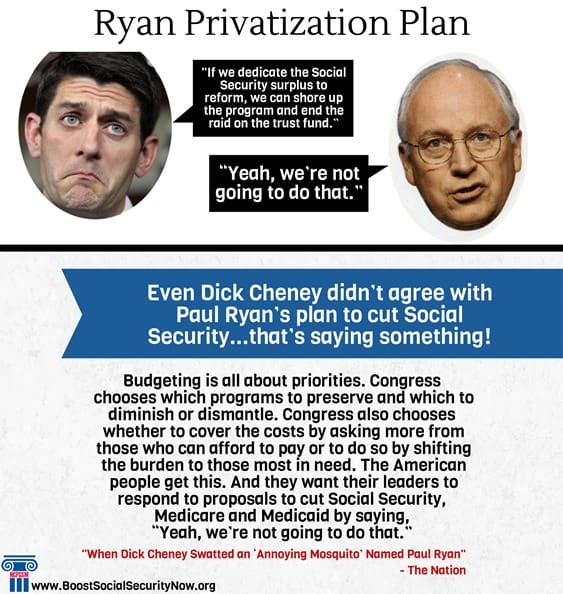John Nichols at The Nation has this week’s must-read story on Rep. Paul Ryan’s never-ending quest to cut Social Security benefits. Nichols has read Ryan’s new book (so we don’t have to) and provides this analysis:
The well-regarded second-term congressman met with Vice President Dick Cheney, who was at the peak of his co-presidency powers. Like Cheney in his younger years, Ryan was a former congressional aide who had worked the conservative think-tank circuit before getting himself elected to the House. The Washington insiders should have gotten on famously.
But the vice president was not buying what the man, who is now described as “the intellectual leader of the Republican Party,” was selling.
Ryan recalls the meeting this way:
“The surplus has given us a huge opportunity,” I explained. “If we dedicate the Social Security surplus to reform, we can shore up the program and end the raid on the trust fund.” I talked about the opportunity to create a real ownership society, how workers could actually own a piece of the free enterprise system through these reforms. As soon as I finished my pitch, Vice President Cheney said, “Yeah, we’re not going to do that.” Then he looked at the person sitting next to me, signaling that he was ready to hear the next idea. His terse reply was the verbal equivalent of someone swatting an annoying mosquito from his face.
Of course later the Bush administration did in fact try to privatize Social Security with a famously failed national town-hall blitz in which the more they talked, the more the American people rebelled against Bush’s plans to send workers’ Social Security to Wall Street. Cheney also supported the privatization of the Pentagon; however, Nichols points out that the politically astute Vice President at least understood one truism that Paul Ryan still seems oblivious to:
Cheney recognized then, as he appeared to again in his 2001 “annoying mosquito” conversation with Ryan, that domestic political calculations require at least some deference to the wisdom of the American people.
Today that wisdom says that the United States need not, and must not, slash the social safety net in order to advance reforms that will be very good for Wall Street but very bad for Main Street. Until Paul Ryan accepts this reality, he will remain stuck on the same questions. Indeed, if the Republicans nominate the ambitious young congressman for president in 2016, and if he runs on the agenda Dick Cheney swatted away fifteen years earlier, Ryan will again find himself asking, “Why did we lose? How did it happen? Why does the Republican Party seem to keep losing ground.”
We recommend you read the whole story here.



